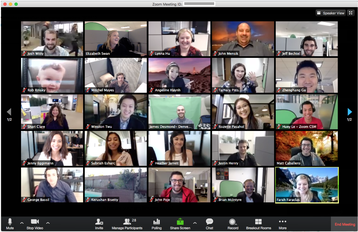Zoom Video Communications has opened a data center in Singapore, its first Southeast Asian facility.
In April, Singapore temporarily halted the use of the app for home-based education after hackers got into sessions and posted obscene images. Singaporean authorities later repealed the ban on the video conferencing app, with more than 400 Singaporean schools now using Zoom.
Abe Smith, Zoom’s head of international, revealed the news to Bloomberg during a virtual briefing on Tuesday. The company worked with Singapore’s Economic Development Board in setting up the new data center, although it is not clear if it is a new facility or wholesale space.
Usage of the conferencing platform has skyrocketed due to the Covid-19 pandemic. To serve its growing needs, the company has primarily used Amazon Web Services, but is expanding its data center portfolio.
American with Chinese links
Zoom now has space in 18 data centers globally, including two in China.
In April, the University of Toronto’s Citizen Lab discovered Zoom encryption keys were coming in from its servers in China.
This led to concerns about the security of user data since Chinese authorities can demand the data of any users that are held in the country.
"A company primarily catering to North American clients that sometimes distributes encryption keys through servers in China is potentially concerning, given that Zoom may be legally obligated to disclose these keys to authorities in China," Citizen Lab said.
Zoom, in response, said the mistake was an oversight due to its rapid growth in China and that it had mistakenly put several Chinese data centers on its whitelist of backup bridges to meet demand.
The Zoom app is developed by three companies in China, which all have the name Ruanshi Software. Two of the three companies are owned by Zoom, but one is owned by an entity called American Cloud Video Software Technology Co.
Due to the links to China, two Congressmen in July asked the US Department of Justice (DoJ) to investigate Zoom along with TikTok due to concerns the companies could work with Chinese authorities.
In a letter to Assistant Attorney General John Demers, Senators Richard Blumenthal (D-Connecticut) and Josh Hawley (R-Missouri) said: “We believe that it is imperative that the Department of Justice investigate and determine whether Zoom and TikTok’s business relationships, data handling practices, and operational connections to China pose a risk to Americans.
“Based on numerous reports, we are extremely concerned that Zoom and TikTok have disclosed private information about Americans to the People’s Republic of China and engaged in censorship on behalf of the Chinese government.”
Zoom told Reuters it welcomed conversations with officials about its global business practices and policies.
Keybase.io
The company has been spending the past year tightening its security - in May, it acquired Keybase.io and, in April, CTO Brendan Ittelson wrote a blog post explaining that paying customers would be able to whitelist and blacklist data center regions themselves.
"Currently, our data centers are grouped into these regions: The United States, Canada, Europe, India, Australia, China, Latin America, and Japan/Hong Kong," Ittelson said.
"For users based in China, if your account admin has not opted into the China data centers by April 25, your account will not be able to connect to our mainland China data centers for data transit."
Zoom earlier this month announced it was stopping its sales of products in China except through local partners. Sales will be conducted only through authorized partners from Aug 23.



